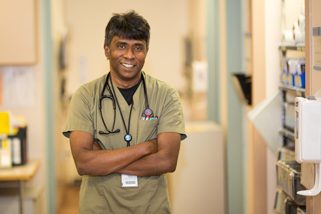Rapid Referral Clinic becoming a success story

By Leslie Shepherd

The Rapid Referral Clinic has been able to hire a full-time dedicated nurse, Avinash Solomon. (Photo by Yuri Markarov)
The hospital’s Rapid Referral Clinic has rapidly become a success.
What started as a six-month pilot project in May 2016 to provide expedited care for patients who present in the Emergency Department with acute medical issues but who can be managed safely as outpatients, has become a five-day-a-week clinic that’s now accepting referrals from the Family Health Team, General Internal Medicine as well as some community physicians.
“We’ve gone from concept to full ambulatory clinic in just a little over one year, funded and supported by the hospital,” said Dr. Robert Sargeant, head of the Division of Internal Medicine, which runs the clinic.
The numbers tell the story: In the first six months, as the clinic ramped up from three mornings a week, it had 358 patient visits. The average wait time from being referred from the ED to seeing a rapid health-care provider was 62 hours, well within the 48- to 72-hour goal. The clinic diverted 116 patients who might otherwise have been admitted; but also directly admitted 15 patients they felt really needed inpatient care.
The clinic was also able to hire a full-time dedicated nurse, Avinash Solomon.
In the morning, the clinic runs as the initial Rapid Referral Clinic seeing patients referred by the ED. Most afternoons it sees post-discharge patients from medicine to both encourage timely discharges from 14 Cardinal Carter and prevent readmissions.
“We can more safely discharge patients on weekends, for example, if we know they will get a timely followup in the clinic,” said Dr. Sargeant.
The clinic has also added five referral slots in the afternoons for Family Health Team patients, which Dr. Sargeant said he believes is a first for a rapid referral clinic in Canada. Instead of sending patients to the ED, family physicians can refer suitable patients to the clinic. They can also refer patients they see in urgent care clinics on weekends who might otherwise have to wait longer for specialist care.
The clinic has also played a key role in the St. Michael’s rollout of a Toronto Central LHIN-funded project known as SCOPE (Seamless Care Optimizing the Patient Experience) that helps solo family physicians gain better access and integration with community and hospital services, including general internal medicine and medical imaging. The current phase of the SCOPE rollout involves 20 individual family practitioners in the LHIN’s mid-east Toronto subregion who can call Rapid Referral Clinic internists for telephone advice and possible referral to the clinic.
Dr. Sargeant said his biggest surprise has been the wide range of patients and ailments the clinic is seeing.
“We’re consistently seeing patients who are actually sick, who can use our interventions, and who have been appropriately referred to us,” he said. “I’ve also been surprised by how much residents love working in the clinic. They want to be prepared to see whatever comes their way when they are out in the real world and they are getting a great breadth of experience.”
About St. Michael’s Hospital
St. Michael’s Hospital provides compassionate care to all who enter its doors. The hospital also provides outstanding medical education to future health care professionals in more than 29 academic disciplines. Critical care and trauma, heart disease, neurosurgery, diabetes, cancer care, care of the homeless and global health are among the Hospital’s recognized areas of expertise. Through the Keenan Research Centre and the Li Ka Shing International Healthcare Education Centre, which make up the Li Ka Shing Knowledge Institute, research and education at St. Michael’s Hospital are recognized and make an impact around the world. Founded in 1892, the hospital is fully affiliated with the University of Toronto.
